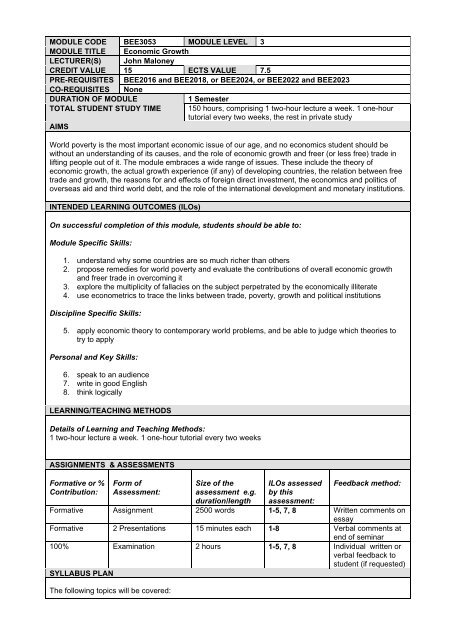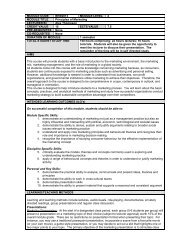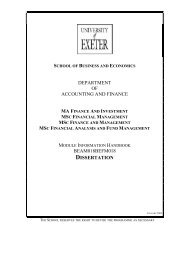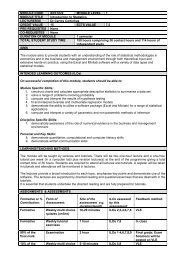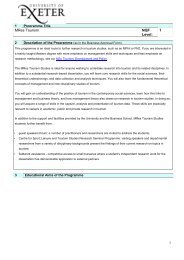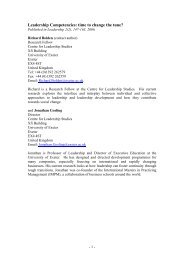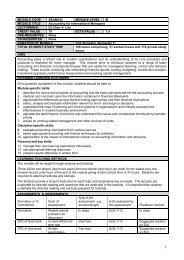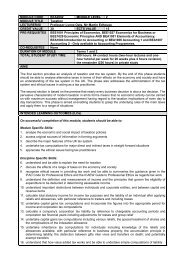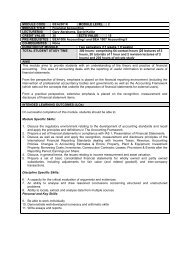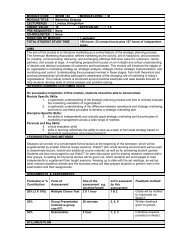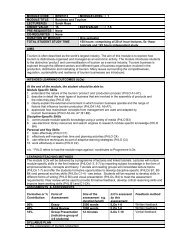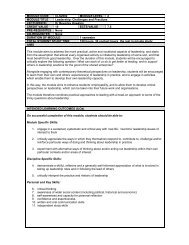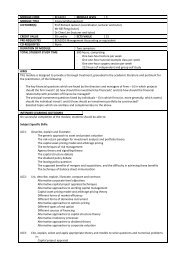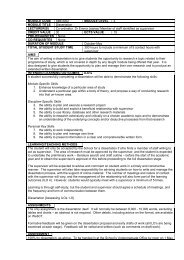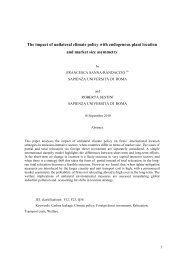MODULE CODE BEE3053 MODULE LEVEL 3 MODULE TITLE ...
MODULE CODE BEE3053 MODULE LEVEL 3 MODULE TITLE ...
MODULE CODE BEE3053 MODULE LEVEL 3 MODULE TITLE ...
Create successful ePaper yourself
Turn your PDF publications into a flip-book with our unique Google optimized e-Paper software.
<strong>MODULE</strong> <strong>CODE</strong> <strong>BEE3053</strong> <strong>MODULE</strong> <strong>LEVEL</strong> 3<br />
<strong>MODULE</strong> <strong>TITLE</strong> Economic Growth<br />
LECTURER(S) John Maloney<br />
CREDIT VALUE 15 ECTS VALUE 7.5<br />
PRE-REQUISITES BEE2016 and BEE2018, or BEE2024, or BEE2022 and BEE2023<br />
CO-REQUISITES None<br />
DURATION OF <strong>MODULE</strong> 1 Semester<br />
TOTAL STUDENT STUDY TIME 150 hours, comprising 1 two-hour lecture a week. 1 one-hour<br />
tutorial every two weeks, the rest in private study<br />
AIMS<br />
World poverty is the most important economic issue of our age, and no economics student should be<br />
without an understanding of its causes, and the role of economic growth and freer (or less free) trade in<br />
lifting people out of it. The module embraces a wide range of issues. These include the theory of<br />
economic growth, the actual growth experience (if any) of developing countries, the relation between free<br />
trade and growth, the reasons for and effects of foreign direct investment, the economics and politics of<br />
overseas aid and third world debt, and the role of the international development and monetary institutions.<br />
INTENDED LEARNING OUTCOMES (ILOs)<br />
On successful completion of this module, students should be able to:<br />
Module Specific Skills:<br />
1. understand why some countries are so much richer than others<br />
2. propose remedies for world poverty and evaluate the contributions of overall economic growth<br />
and freer trade in overcoming it<br />
3. explore the multiplicity of fallacies on the subject perpetrated by the economically illiterate<br />
4. use econometrics to trace the links between trade, poverty, growth and political institutions<br />
Discipline Specific Skills:<br />
5. apply economic theory to contemporary world problems, and be able to judge which theories to<br />
try to apply<br />
Personal and Key Skills:<br />
6. speak to an audience<br />
7. write in good English<br />
8. think logically<br />
LEARNING/TEACHING METHODS<br />
Details of Learning and Teaching Methods:<br />
1 two-hour lecture a week. 1 one-hour tutorial every two weeks<br />
ASSIGNMENTS & ASSESSMENTS<br />
Formative or %<br />
Contribution:<br />
Form of<br />
Assessment:<br />
Size of the<br />
assessment e.g.<br />
duration/length<br />
ILOs assessed<br />
by this<br />
assessment:<br />
Feedback method:<br />
Formative Assignment 2500 words 1-5, 7, 8 Written comments on<br />
essay<br />
Formative 2 Presentations 15 minutes each 1-8 Verbal comments at<br />
end of seminar<br />
100% Examination 2 hours 1-5, 7, 8 Individual written or<br />
verbal feedback to<br />
student (if requested)<br />
SYLLABUS PLAN<br />
The following topics will be covered:
Neoclassical growth theory<br />
Endogenous growth theory<br />
Is trade good for growth?<br />
Does trade relieve poverty?<br />
Foreign direct investment and its distribution<br />
Capital mobility and the developing countries<br />
The economics of overseas aid.<br />
Third world debt<br />
The role of the World Bank and the IMF<br />
Global capitalism: an overview<br />
Conclusion: Why are some countries rich and other poor?<br />
INDICATIVE LEARNING RESOURCES<br />
Indicative basic reading list:<br />
Weil, D. (2009) Economic Growth, 2 nd edition, Pearson/Addison Wesley<br />
DATE OF LAST REVISION JM February 2011


